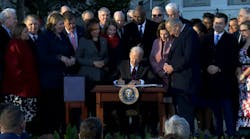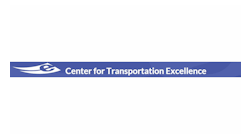2022 election results: Voters support 14 out of 19 transit ballot initiatives
The November 2022 midterm election in the United States saw voters approve 14 of the 19 transit measures put before them in communities across the country.
Among the measures approved are a tax on high income earners in Massachusetts, with a portion of the revenues supporting transit investments, a more than $52-million bond in Arlington County, Va., where transit will benefit from the funds and various millage renewals in Michigan.
The measures passed add to the 15 that have already been passed by voters in 2022, bringing the total to 29 out of 36 wins for transit, which is an 80.56 percent win rate and represents billions in transit investment.
“Almost one year ago, President Biden signed the historic Infrastructure Investment and Jobs Act to provide state and local communities with long overdue funding for transportation, including public transit. In the year since, communities have met the moment and stepped up with bold visions for their transportation futures and asked voters for local funding to match,” said American Public Transportation Association (APTA) President and CEO Paul P. Skoutelas. “We’re heartened to see that voters have once again put trust in their communities with overwhelming victories for measures funding public transit across the nation last night and throughout the past year, and we’re excited to see even more communities follow suit in 2023 and 2024.”
Tuesday’s results add to a string of historic years for transit at the ballot box, with more than 85 percent of measures winning for public transit from 2017 to 2022. At a time when the federal government is more committed than ever to funding transit and infrastructure, APTA says voters agree and are putting their money where their mouth is to provide a local match.
“For years, the public’s support for transit has been on a roll, and 2022 is no different,” said Josh Cohen, executive director of APTA’s Center for Transportation Excellence. “Voters support transit at the ballot box because it can transform a community and create pathways to a more equitable and accessible future. Transit is the only issue that unites leaders from all walks of society, from elected officials to transit agencies, to business, to labor, to the grassroots, around a common vision that benefits all of us. While some of the larger measures suffered a setback, the results from the 2022 elections reflect a years-long trend toward greater investment.”
Some of the biggest victories for public transit during the 2022 midterm election include:
• An extension of a half-cent sales tax for 30 years in San Francisco, Calif. This measure will allow the local transportation authority to issue up to $1.91 billion in bonds for transportation projects.
• A statewide ballot initiative in Massachusetts that would place an additional four percent tax on earners over $1 million – in addition to the existing five percent flat-rate state income tax – to generate a total revenue of $1.3 billion. The revenue can be used for education, roads, bridges and public transportation.
• A $52.6 million bond to fund a variety of transportation, road, pedestrian enhancement and transit projects across Arlington County, Va.
• Two propositions to stay with Capital Metro (CapMetro) and maintain public transit service in Lago Vista and Manor, Texas, joining a similar victory earlier this year in Leander, Texas.
CapMetro issued a statement following the results that read, “The agency is appreciative of the support and is eager to continue connecting our region through a variety of services, such as Pickup, MetroAccess, bus and rail. Although CapMetro services are strongly utilized across the region, cities are faced with tough choices due to limited funding. The agency understands why these measures are placed on ballots, but time and time again, Central Texans have strongly voiced their support for sustainable, equitable and robust public transportation. As the region continues to grow, CapMetro is prepared to grow with it by increasing and providing more services throughout our communities.”
In Michigan, multiple transportation millage renewals and initiatives were approved, including:
• A levy of 0.478-mill to continue the Bay Area Transit Authority’s bus service in both Grand Traverse and Leelanau County for four years.
• A six-year renewal of 0.2 of one-millage for the Huron Transit Corporation in Huron County.
• A renewal of a 0.95-mill rate to maintain and increase SMART transit services for five years in Macomb County.
• A 10-year, countywide 0.95-mill rate to fund SMART bus transportation system and expand mass transit in Oakland County.
• A four-year 0.996-mill tax for SMART services in Wayne County.
Following the successful page of the transit millages in Wayne, Oakland and Macomb counties, Regional Transit Authority Board of Directors Chair Paul Hillegonds said, “Residents let their voices be heard and opted to enhance vital transportation services that will provide the ability to improve transit options in their communities. This vote is a win for the future of transit and mobility in our region. It sets us on a path of improved quality of life, better job access and development opportunities, environmental sustainability and job creation. The Regional Transit Authority looks forward to working with regional leaders, transit riders and citizens to make Southeast Michigan a leader in transit and mobility.”
Several countywide sales tax measures in Colorado, such as:
• An extension of the 0.1 percent countywide transportation sales tax in Boulder County.
• A 0.5-cent sales tax increase to fund a new transit authority in Eagle County.
• An extension of the Pikes Peak Regional Transportation Authority's one-cent sales tax for 10 years in El Paso County.
The transit measures that fell short include:
• The early renewals of Measure C sales tax for transportation in Fresno County, Calif., and Measure T sales tax in Madera County, Calif. Both measures required two-thirds supermajority support to pass and both fell short of that mark. The current tax in each county does not expire until 2026, so the counties still have time to pursue another renewal without a loss of funding.
• A sales tax measure for transportation in Hillsborough County, Fla., which faced legal challenges in the past few weeks, with a judge removing the item from the ballot until the court of appeals issued a stay of that order.
• A sales tax measure for transportation in Orange County, Fla.
• A sales tax measure for transportation in New Hanover County, N.C.
A sales tax initiative in Sacramento County, Calif., that would raise the county sales tax by one-half of one percent for 40 years and raise $8.5 billion to fund dozens of transportation projects has not officially been called. However, the measure is currently trailing with 53 percent voting against the measure and 46 percent to approve.
Mass Transit Staff Report
Stories under this byline were produced through a team effort by the editorial staff of Mass Transit.
To learn more about our team, click here.
If you have a story idea, let us know by emailing [email protected]. Please review our contributor guidelines found here.






